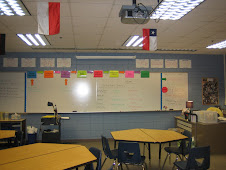Title – predict what the poem will be about
Paraphrase – re-tell "the story of the poem." What's the literal meaning?
Connotation – What do words mean beyond their literal meaning? Do words symbolize something? What poetic devices are used?
Attitude – What is the attitude of the speaker?
Shifts – Where are the shifts in attitude?
Title – Look again at the title to re-examine and determine any connotative meaning.
Theme – So what does this poem have to say about human experience? What is the life lesson?
Our first TPCASTT of the year was on the following poem:
"Assembly Line" by Shu Ting
Translated by Carolyn Kizer
In time's assembly line
Night presses against night.
We come off the factory night-shift
In line as we march towards home.
Over our heads in a row
The assembly line of stars
Stretches across the sky.
Beside us, little trees
Stand numb in assembly lines.
The stars must be exhausted
After thousands of years
Of journeys which never change.
The little trees are all sick,
Choked on smog and monotony,
Stripped of their color and shape.
It's not hard to feel for them;
We share the same tempo and rhythm.
Yes, I'm numb to my own existence
As if, like the trees and stars
-- perhaps just out of habit
-- perhaps just out of sorrow,
I'm unable to show concern
For my own manufactured fate.
Click on comments to further discuss this poem.
Thursday, September 13, 2007
Subscribe to:
Post Comments (Atom)





3 comments:
This is an interesting poem that I think dwells on the more habitual and depressing times of life. I believe the author implies that everything in the course of the world and worldly events has repetition that cannot be escaped. He parallels ones life to that of a tree, "we share the same tempo and rhythm," to illustrate a monotonous life of development, maintenance, and death. (Which is really the core of biology, or simply - life) Shu really does not give much depth to the meaning of life, presenting it a lot like a shallow game or duty. The "numbness" that he feels toward his existence is representative of his view on the world as ever proceeding, without nuance, in an "assembly line." At the end of the poem I think Shu's use of both the words "habit" and "sorrow" contrast in the way that habit implies something without emotional depth, and that sorrow implies much human emotion. (Possibly giving some kind of hope to a more eclectic world) As for myself I find this poem extremely interesting but depressing - I like to believe that there is inexhaustible difference and an infinity of paths in the world. The paths we lead and the turns we take are ever determining our life.
there were never two t's at the end of TPCAST before,interesting. and i really don't like TPCASTING,it wastes time,
Shu Ting is a woman
So it's 'she' instead of 'he'.
Post a Comment